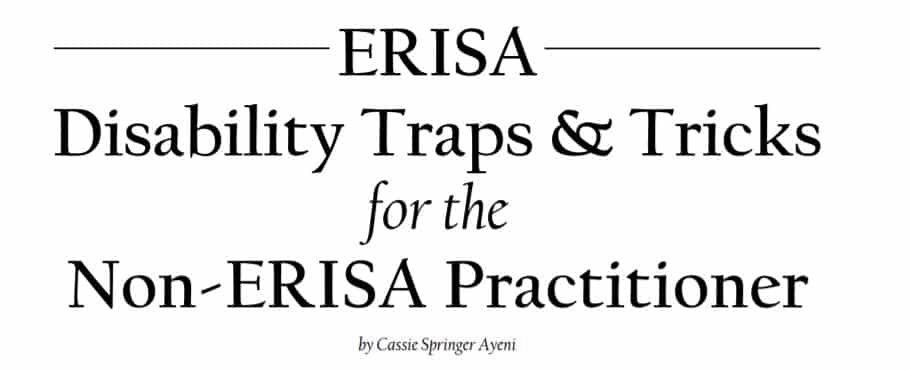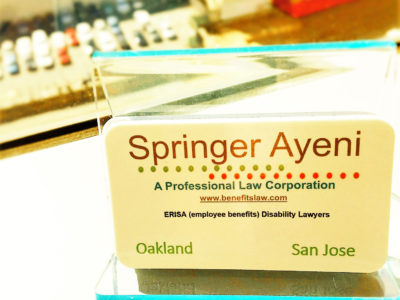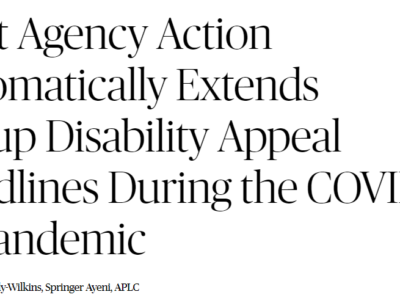
ERISA Disability Traps & Tricks for the Non-ERISA Practitioner
By Cassie Springer Ayeni, President Springer Ayeni, A Professional Law Corporation
The Employee Retirement Income Security Act, better known as ERISA, is referred to by at least one judge as “Everything Ridiculous Imagined Since Adam.” Florence Nightingale Nursing Service, Inc. v. Blue Cross and Blue Shield, .832 F. Supp. 1456, 1457 (N.D. Ala. 1993), affirmed, 41 F.2d 1476 (11th Cir. 1995) (Acker, J.). It gets its sordid reputation from its limited remedies, roots in trust law, and limited discovery rules. Yet ERISA is so vast that every lawyer should know a little bit about it.
Most practitioners know that ERISA covers employer-sponsored retirement plans, yet few realize that with minor exceptions[1] it also governs all employer-sponsored health plans, disability benefit plans, and life insurance plans. 29 U.S.C. § 1002. Of these categories of ERISA litigation, disability benefit lawsuits comprise 64.5% of ERISA litigation, health care accounts for 14.4% or ERISA litigation, and pension just 9.3%. Anderson, S., ERISA Benefits Litigation: An Empirical Picture, 28 ABA J. Lab. & Emp. L. 1 (2012) at p. 7. Why is that? Though ERISA was originally designed to protect pension claims, more and more employers are eliminating traditional pension plans for employees or have outsourced to fiduciaries, and ERISA provides limited relief for breaches of fiduciary duties. Health claims are notoriously mishandled (we all probably have our own examples of that!), yet if a plaintiff brings an ERISA claim for denied health benefits, the remedy is that the medical provider gets reimbursed, and there are no punitive, compensatory, or consequential damages available to the plaintiff. Disability benefit claims, however, are another story. If a worker with an employer-sponsored disability benefit plan files a claim for benefits, that claim is typically administered and paid for by an insurance company. And because these insurers have a financial conflict of interest, many disability benefit claims are denied despite the claimant’s doctor’s decision that the claimant should stop working. The remedy under ERISA is payment of the disability benefits through the date of judgment, and benefits can potentially continue until retirement age. In other words, disability benefits are worth a lot over the claimant’s working lifetime. That’s why a little ERISA knowledge comes in handy for any practitioner.
Screening for ERISA
First, in screening these calls from potential clients, be aware that some issue spotting will be incredibly valuable, as most individuals do not even realize that their claim for disability benefits is governed by ERISA. Most individuals call with an assumption that the appropriate area of expertise is disability discrimination, workers’ compensation, Social Security disability, or California state disability insurance. But if the employer offered a disability plan, it is ERISA help they need.
TRAP #1: Assuming that the potential client knows what kind of attorney she needs for her disability issues. TRICK #1: Simply ask “did your employer offer a disability benefit plan?” If so, ERISA will probably govern.
Severance Waivers of ERISA Claims
Second, many people with disabilities may contemplate quitting their job for performance issues or have already been told they will be terminated. If they are getting close to retirement age, they may assume that an early retirement is the honorable way to exit the job. The disabled worker may be offered separation or severance pay, but many standard separation or severance agreements actually waive all claims under ERISA! If someone could potentially obtain a monthly disability benefit until retirement age through their disability benefit plan, this is an extremely valuable benefit to waive in exchange for severance. Indeed, the prudent plaintiff’s attorney should routinely screen for disability if negotiating severance, as no one would want to give the green light for waiving hundreds of thousands of dollars in disability benefits in exchange for a little severance.
TRAP #2: Failing to edit out a waiver of ERISA claims. TRICK #2: Carve out any claims for disability benefits, health benefits, or pension benefits that might arise under ERISA. An example of a good carve out is: “However, the following claims are specifically and expressly excluded from the foregoing Release: (i) health insurance benefits under ERISA or the Consolidated Omnibus Budget Reconciliation Act (COBRA); (ii) claims with respect to benefits, including short- and long-term disability benefit benefits, under a welfare benefit plan governed by the Employee Retirement Income Security Act (ERISA); or (iii) claims with respect to vested benefits under a retirement plan governed by ERISA.” Most employers understand the practicality of this, particularly because such claims are usually (but not always) filed against the disability insurer, not the employer.
Strict ERISA Deadlines
Third, although it is best for the potential client to find an ERISA attorney before making the decision to apply for disability benefits, most do not. Rather, most potential clients try to find legal help only after the insurer has denied the claim for disability benefits. At that point, ERISA’s Regulations prescribe a 180-day period for appealing the denied benefit claim. This process MUST be completed or else the claimant loses the right to file suit, also known as “failure to exhaust administrative remedies.”
TRAP #3: Failing to submit an appeal of an adverse disability benefit decision within 180 days of receipt of that decision. TRICK #3: Don’t miss this deadline! But if all else fails, immediately call the insurer to request an extension. ERISA’s regulations allow for “at least” 180 days, but it is up to the insurer to allow an extension. If granted over the phone, immediately follow it up in writing and indicate a date by which the claimant will submit the appeal.
Evidence in the Appeal
Fourth, although filing a hasty appeal is all that is necessary to preserve the ability to file a lawsuit, a scant appeal letter will not win the appeal, nor will it enable an ERISA practitioner to take the case for litigation. ERISA disability litigation is limited to the factual evidence presented in the aforementioned administrative appeal. Once in court, in all but rare circumstances, there will be no depositions, further medical records, or opportunities for direct or cross-examination. And there are also no jury trials. So if you help someone with their disability benefit appeal, please be sure to include all evidence necessary to win the case down the road.
TRAP #4: Assuming that there will be a chance in court to put in more evidence supporting the disability claim. TRICK #4: Throw in everything but the kitchen sink into the appeal! If you think the evidence might be useful in litigation, put it into the appeal. Declarations from the client, friends, family, medical providers, and colleagues, as well as all relevant medical records and expert reports, are key to submit in the appeal of a denied claim.
Filing an ERISA or ERISA-Related Claim
Finally, if you do decide to litigate an ERISA claim, be aware that these claims must be brought in federal court or you will face removal of the ERISA claims and all claims related to the ERISA claims. With limited exceptions, if you are bringing state law claims and ERISA claims, ERISA will preempt those state law claims.[2]
TRAP # 5: Failing to separate any state law claims from ERISA claims. TRICK # 5: Don’t even mention ERISA or other employee benefits or benefit-related remedies in your state law complaint. Leave the ERISA claims alone and litigate those separately as ERISA claims in federal court, or face removal.
TRICK #6: Give me a call. I’m an ERISA nerd and I’m happy to field your ERISA questions! 510-926-6768 Option1, or cassie@benefitslaw.com
Cassie Springer Ayeni is the President of Springer Ayeni, A Professional Law Corporation, in Oakland, CA, where she focuses on ERISA disability and life insurance cases. She can be reached at cassie@benefitslaw.com or www.benefitslaw.com
[1] Those exceptions are for public employees (anyone who works for the government such as teachers, legislators, public safety officers, etc.), and “church plans,” (anyone employed, even tangentially, by a religious organization including those who work at Catholic hospitals).
[2] ERISA’s “savings clause” provision saves from preemption any law that regulates insurance, banking, or securities. ERISA § 514(b)(2)(A). An example of the application of the savings clause is in California’s “notice prejudice” rule, which provides that claims can proceed even where there is late notice unless the insurer is prejudiced by the late notice. Because this is a law that regulates insurance and does not provide a remedy that conflicts with ERISA, the law is not preempted. UNUM Life Ins. Co. of Am. v. Ward, 526 U.S. 358, 373, 119 S. Ct. 1380, 1389, 143 L. Ed. 2d 462 (1999).




